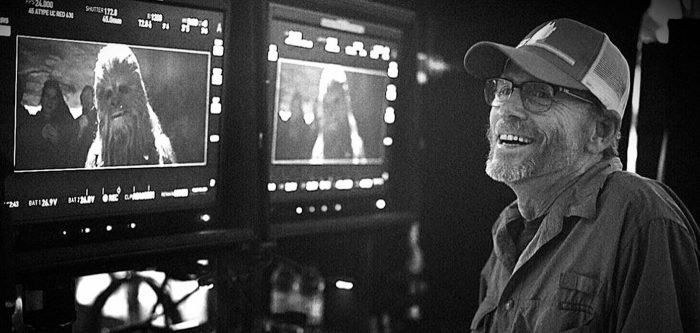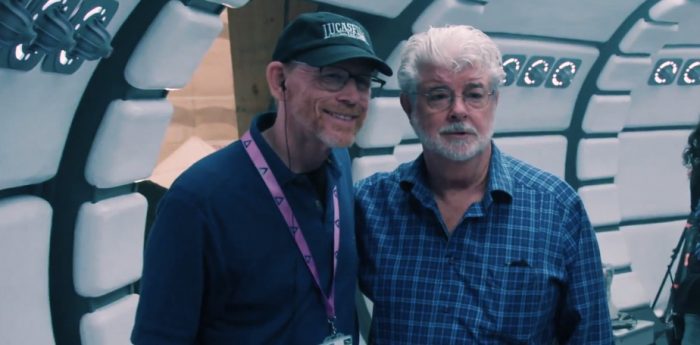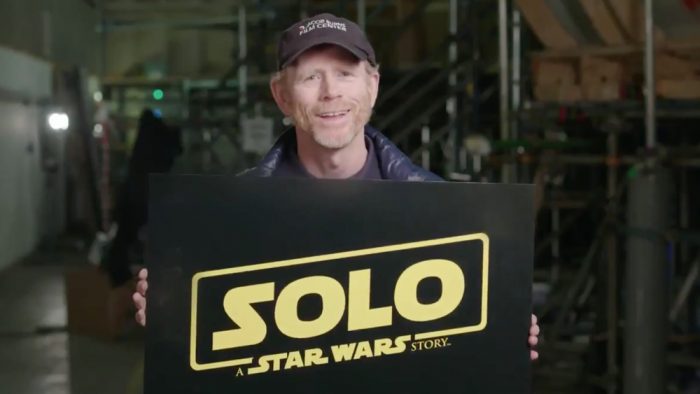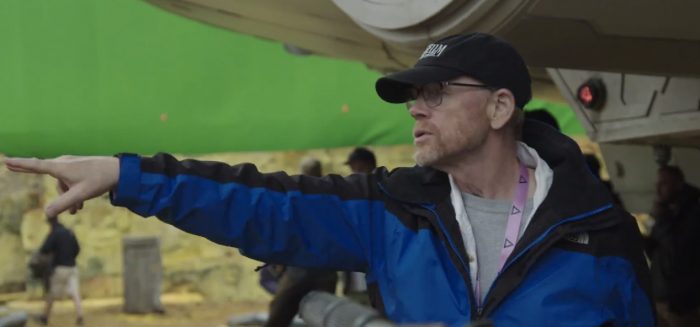Ron Howard Talks About The Unique Challenge Of Making 'Solo' [Interview]
Interviewing Ron Howard for Solo: A Star Wars Story was unlike any filmmaker interview I have done to date.
Usually, in my chats with directors, I talk a lot about development and intention. Yet this production was very different in that Howard came on as a replacement late into the production process. The script, casting, crew, and design of the movie had been already planned and partially executed. So I was curious how this film was uniquely different from the dozens of films he had made over his long illustrious career.
You can read our discussion below. It is spoiler-free – we have removed a spoiler-filled answer, which will be published the week after release.
Good, how are you? Nice to see you.
Good to see you. I really enjoyed the movie.
Oh, thank you.
This is a different challenge than your typical film for a number of reasons, being a Star Wars film. But also because you're also coming so late in the process.
Yeah.
So how was this different from a typical Ron Howard movie?
It was an interesting journey. And I realized I had to rely on my raw instincts more than I normally would, because I didn't have the time to prepare a movie and sort of develop a point of view about it. I had to have a point of view, but I needed to have it that instant. And without having lived with it for months or years. And it was interesting because I had to trust those instincts.
And I had collaborators I could turn to as a kind of a safety net, but I clearly saw that no one was looking for me to be a figurehead. It's not the way these movies and Lucasfilm works. They wanted the leadership. And so that was interesting. The other thing was I went into it feeling that I was gonna apply my experience and my professionalism to this and I really like the story and I believed in it. But it was almost an arm's length kind of a relationship that I was gonna have with this. And I'd take advantage of the fact that they needed me at a time when I wasn't planning to direct anything anyway. And I would sort of tackle it as a professional slash creative challenge.
And it did not take long before I was all-in and I was just as emotionally connected to what we were doing. And certainly by the time we went into post and I was really seeing the movie as a whole, we went back, the one thing I'd asked for was to make sure that we had at least a couple of weeks to go back and be able to do some reshoots and pickups of the choices that I was making 'cause I knew there would be a lot of experimentation and exploration. We didn't need quite all the time that we'd set aside, but we needed, I don't know, seven or eight days. And...
That's not a lot...
Yeah, not that much, but it was significant. And so everything about the process was again a little more driven by kind of raw instinct and a sort of a leadership style that needed to quickly cut through the range of options and make decisions. And I certainly looked to the collaborators but and used them and I rallied them. I sort of, I said, I need one of you Kasdans [to] stay here. Larry immediately turned to his younger son. Pointed to him. But Kathy [Kennedy] pledged to be around as much as she could. And the other producers were on deck. And so it was the whole, as we began to feel it working, it was pretty thrilling actually and kind of affirming in way.
 Coming onto this film, you were handed a lot of stuff that was already solidified, like the cast and the crew, designers. How much leeway do you have to like add your own mark to that, especially in an action scene like the train heist?
Coming onto this film, you were handed a lot of stuff that was already solidified, like the cast and the crew, designers. How much leeway do you have to like add your own mark to that, especially in an action scene like the train heist?
A lot. A lot. A lot. The action scenes were, they'd been begun but they were far from completion. And there were a lot of question marks about those sequences. So there was a lot of urgent think tanking and brainstorming around those sequences.
So is it a case of you being married to the designs and the models and it's your toy set to play with?
Yes. And sort of what happens next. Here's the script. Here are some pre-vises. Here's some what else? What else can we do? And my goal there was to link the key action scenes as much as possible to Han's experience. I really, I loved [cinematographer] Bradford Young's approach. I thought it looked great. I was happy to inherit that. And I love the aesthetic. And the one thing that I wanted to do was sort of more intentionally and purposefully stage the scenes and shoot them so that they, you felt like you were right alongside Han Solo in this adventure as much as possible. I felt like that would generate a little more immediacy and suspense along with the humor and the excitement and the fun of those sequences.
You mentioned Bradford Young and the movie looks unlike any Star Wars movie to date. But you still were able to capture the tone and the adventure and the humor. Is that a tough balance?
Well it's, it requires a lot of work and intention. And Bradford was really interested in that. You know, could you give the look that sort of carried those vibes? Bradford talks about seeing him having vibes. And still create the kind of character connection, the cinematic urgency and make the plot points clear enough so that the narrative was hurtling along. And he was completely understood that and was excited about that. It required in some instances more coverage that sort of purposeful coverage, trying to bridge things than he might have expected. But he was excited and game.
 You have a long legacy with George Lucas. I mean, I don't have to tell you. But you were originally asked to do one of the Star Wars prequels?
You have a long legacy with George Lucas. I mean, I don't have to tell you. But you were originally asked to do one of the Star Wars prequels?
Asked, but I really wanna underline it. It wasn't like some sort of [formal] offer. It wasn't like I read the script and had an opinion. [George Lucas] was beginning to get serious about doing the prequels, he reached out to a few people and I was one of them and just sort of dropped in conversation the question, would you wanna do one of these? And I already worked for George on Willow. And which was an amazing learning experience and life experience. And deepened our friendship. But at that point, we were really launching Imagine. I was focused on that. And it just didn't make any sense for me to disappear for a couple of years into a sequel. And I felt, and one of the things that I liked about this movie opportunity was that I didn't view it as a sequel. I viewed it as an offshoot. And it certainly demanded a sort of fealty to the galaxy as we understand it and–
Yeah, an authenticity to it.
And an authenticity in that regard. But it was a standalone movie.
You haven't done many sequels. You've done like 35 films and only the Da Vinci Code follow-ups are really sequels.
Yeah, those are the only ones. And so it's an unusual set of circumstances that led me to this, but I'm grateful for those twists, a twist of fate.
 Would you come back for more [Solo or Star Wars] if they–?
Would you come back for more [Solo or Star Wars] if they–?
I would never say never, I just don't know what's going on at Imagine. And by the way, there's no plan. So that wasn't a step toward sequels. I love this cast. And I had so much fun in this sort of the filmmaking playground that is this universe. And so if the answer is I'd be very, very open to it. I have no idea, you know, whether they would, you know?
I think people will want one. So thank you so much.
Thanks.

